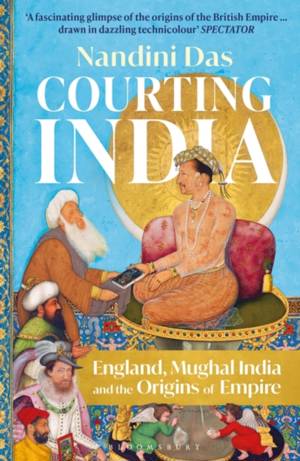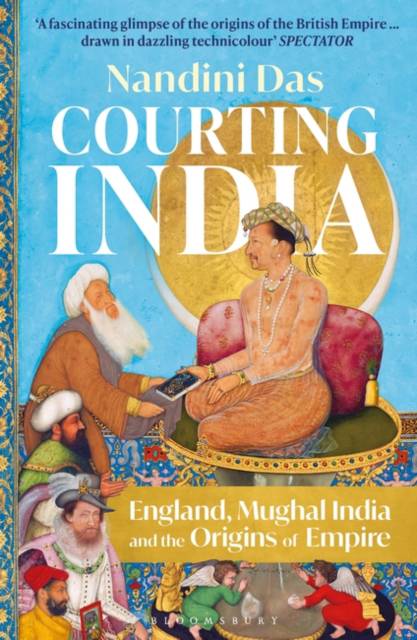
- Retrait en 2 heures
- Assortiment impressionnant
- Paiement sécurisé
- Toujours un magasin près de chez vous
- Retrait gratuit dans votre magasin Club
- 7.000.0000 titres dans notre catalogue
- Payer en toute sécurité
- Toujours un magasin près de chez vous
18,45 €
+ 36 points
Description
A profound and ground-breaking new history of one of the most important encounters in the history of colonialism: the British arrival in India in the early seventeenth century.
'A triumph of writing and scholarship. It is hard to imagine anyone ever bettering Das's account of this part of the story' - William Dalrymple, Financial Times
'A fascinating glimpse of the origins of the British Empire . . . drawn in dazzling technicolour' - Spectator
'Beautifully written and masterfully researched, this has the makings of a classic' - Peter Frankopan
SHORTLISTED FOR THE BRITISH ACADEMY BOOK PRIZE
LONGLISTED FOR THE CUNDILL HISTORY PRIZE
LONGLISTED FOR THE HWA CROWN AWARDS
When Thomas Roe arrived in India in 1616 as James I's first ambassador to the Mughal Empire, the English barely had a toehold in the subcontinent. Their understanding of South Asian trade and India was sketchy at best, and, to the Mughals, they were minor players on a very large stage. Roe was representing a kingdom that was beset by financial woes and deeply conflicted about its identity as a unified 'Great Britain' under the Stuart monarchy. Meanwhile, the court he entered in India was wealthy and cultured, its dominion widely considered to be one of the greatest and richest empires of the world.
In Nandini Das's fascinating history of Roe's four years in India, she offers an insider's view of a Britain in the making, a country whose imperial seeds were just being sown. It is a story of palace intrigue and scandal, lotteries and wagers that unfolds as global trade begins to stretch from Russia to Virginia, from West Africa to the Spice Islands of Indonesia.
A major debut that explores the art, literature, sights and sounds of Jacobean London and Imperial India, Courting India reveals Thomas Roe's time in the Mughal Empire to be a turning point in history - and offers a rich and radical challenge to our understanding of Britain and its early empire.
'A triumph of writing and scholarship. It is hard to imagine anyone ever bettering Das's account of this part of the story' - William Dalrymple, Financial Times
'A fascinating glimpse of the origins of the British Empire . . . drawn in dazzling technicolour' - Spectator
'Beautifully written and masterfully researched, this has the makings of a classic' - Peter Frankopan
SHORTLISTED FOR THE BRITISH ACADEMY BOOK PRIZE
LONGLISTED FOR THE CUNDILL HISTORY PRIZE
LONGLISTED FOR THE HWA CROWN AWARDS
When Thomas Roe arrived in India in 1616 as James I's first ambassador to the Mughal Empire, the English barely had a toehold in the subcontinent. Their understanding of South Asian trade and India was sketchy at best, and, to the Mughals, they were minor players on a very large stage. Roe was representing a kingdom that was beset by financial woes and deeply conflicted about its identity as a unified 'Great Britain' under the Stuart monarchy. Meanwhile, the court he entered in India was wealthy and cultured, its dominion widely considered to be one of the greatest and richest empires of the world.
In Nandini Das's fascinating history of Roe's four years in India, she offers an insider's view of a Britain in the making, a country whose imperial seeds were just being sown. It is a story of palace intrigue and scandal, lotteries and wagers that unfolds as global trade begins to stretch from Russia to Virginia, from West Africa to the Spice Islands of Indonesia.
A major debut that explores the art, literature, sights and sounds of Jacobean London and Imperial India, Courting India reveals Thomas Roe's time in the Mughal Empire to be a turning point in history - and offers a rich and radical challenge to our understanding of Britain and its early empire.
Spécifications
Parties prenantes
- Auteur(s) :
- Editeur:
Contenu
- Nombre de pages :
- 480
- Langue:
- Anglais
Caractéristiques
- EAN:
- 9781526615664
- Date de parution :
- 15-02-24
- Format:
- Livre broché
- Dimensions :
- 130 mm x 198 mm
- Poids :
- 360 g

Seulement chez Librairie Club
+ 36 points sur votre carte client de Librairie Club
Les avis
Nous publions uniquement les avis qui respectent les conditions requises. Consultez nos conditions pour les avis.





